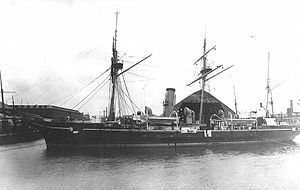Camelion-class sloop
This article relies largely or entirely on a single source. (February 2013) |
 HMS Rinaldo
| |
| Class overview | |
|---|---|
| Name | Camelion class |
| Operators | |
| Built | 1860–1866 |
| Planned | 16 |
| Completed | 8 |
| Cancelled | 8 |
| General characteristics | |
| Displacement | 1,365 tons |
| Length | 185 ft (56 m) |
| Beam | 33 ft (10 m) |
| Draught | 14 ft 8 in (4.47 m) |
| Installed power | 200 hp (150 kW) |
| Propulsion |
|
| Sail plan | Barque-rigged |
| Speed | 9 knots (17 km/h; 10 mph) |
| Complement | 180 |
| Armament |
|
The Camelion class was a class of screw-driven sloops of wood construction, designed by Isaac Watts and operated by the Royal Navy. Eight ships of the class were built from 1858 to 1866 with another eight cancelled. They were initially rated as second-class sloops, but were later reclassified as corvettes.
Design
[edit]The class was designed by Issac Watts as second-class sloops of 17 guns, and were a lengthened version of the Cruizer class.[1]
Construction
[edit]Built of a traditional wood structure, they were 185 feet (56 m) long at the gundeck, 33 feet (10 m) in beam and displaced 1,365 tons. A barque rig was fitted to allow easy sail handling with a relatively small crew of 180.[1]
Propulsion
[edit]They were fitted with a two-cylinder horizontal single-expansion steam engine (although Perseus and Reindeer received single trunk steam engines) driving a single screw. These engines generated 200 nominal horsepower, giving a speed of approximately 9 knots (17 km/h; 10 mph).[1]
Armament
[edit]They were armed with five 40-pounder breech-loading guns and twelve 32-pounder muzzle-loading smoothbore guns, although Reindeer was completed with a single 110-pounder and five 64-pounder guns.[1]
Ships
[edit]The first two vessels were ordered on 3 April 1854, although neither was laid down for several years. Another three were ordered on 1 April 1857 and a further three on 27 March 1858. The final eight ships were ordered in two batches on 5 March 1860 and 25 March 1861, but were either cancelled, or in the case of Circassian and Trent, completed as ironclad sloops under new names.
| Name | Ship Builder | Laid down | Launched | Completed | Fate |
|---|---|---|---|---|---|
| Camelion | Deptford Dockyard | 8 November 1858 | 23 February 1860 | 30 July 1861 | Sold for breaking up 1883 |
| Pelican | Pembroke Dockyard | 16 June 1859 | 19 July 1860 | 25 September 1861 | Sold in February 1867 as mercantile Hawk, then resold to the Portuguese Navy and renamed Infanta Dom Henrique |
| Rinaldo | Portsmouth Dockyard | 1 March 1858 | 26 March 1860 | 8 June 1861 | Sold for breaking up April 1884 |
| Zebra | Deptford Dockyard | 4 July 1859 | 13 November 1860 | 23 May 1861 | Sold in the Far East for breaking up 20 August 1873 |
| Perseus | Pembroke Dockyard | 20 July 1860 | 21 August 1861 | September 1862 | Became training ship in 1886, renamed Defiance II in March 1904, sold for breaking up 26 June 1931 |
| Chanticleer | Portsmouth Dockyard | 2 February 1860 | 9 February 1861 | December 1861 | 02.10.1862 paddle ship Iona of David Hutcheson & Co wrecked off Gourock following a collision with the newly launched Chanticleer.[2] April 1866, accompanied Lord John Hervey and Henry Strutt, 2nd Baron Belper on a trip to Astakos to pay ransom for their captured friend Mr Coore[3] |
| Reindeer | Chatham Dockyard | 1 May 1860[Note 3] | 29 March 1866 | October 1866 | Sold for breaking up 28 August 1873 |
| Rattler | Deptford Dockyard | 28 August 1860 | 18 March 1862 | July 1862 | Wrecked off Japan 24 September 1868 |
| Harlequin | Portsmouth Dockyard | 13 February 1861 | Cancelled 16 December 1864 | ||
| Tees | Chatham Dockyard | February 1861 | Cancelled on 12 December 1863 | ||
| Sappho | Deptford Dockyard | 1 May 1861 | Cancelled on 12 December 1863 | ||
| Trent | Pembroke Dockyard | 3 September 1861 | Completed as the ironclad sloop HMS Research | ||
| Circassian | Deptford Dockyard | 5 May 1862 | Completed as the ironclad sloop HMS Enterprise | ||
| Diligence | Chatham Dockyard | 1862 | Cancelled on 12 December 1863 | ||
| Imogene | Portsmouth Dockyard | Cancelled on 12 December 1863 | |||
| Success | Pembroke Dockyard | Cancelled on 12 December 1863 |
Notes
[edit]References
[edit]Citations
[edit]- ^ a b c d Winfield p.216
- ^ "J & G Thomson Ships". acumfaegovan.com. Archived from the original on 23 October 2014. Retrieved 25 October 2014.
- ^ "Lord John Hervey Amongst the Philistines". No. 4 April 1866. The Mercury, Hobart. 1866.
Bibliography
[edit]- Colledge, J. J.; Warlow, Ben (2006) [1969]. Ships of the Royal Navy: The Complete Record of all Fighting Ships of the Royal Navy (Rev. ed.). London: Chatham Publishing. ISBN 978-1-86176-281-8.
- Winfield, R.; Lyon, D. (2004). The Sail and Steam Navy List: All the Ships of the Royal Navy 1815–1889. London: Chatham Publishing. ISBN 978-1-86176-032-6. OCLC 52620555.
